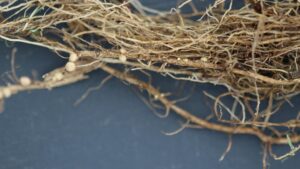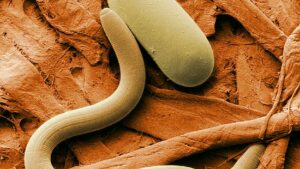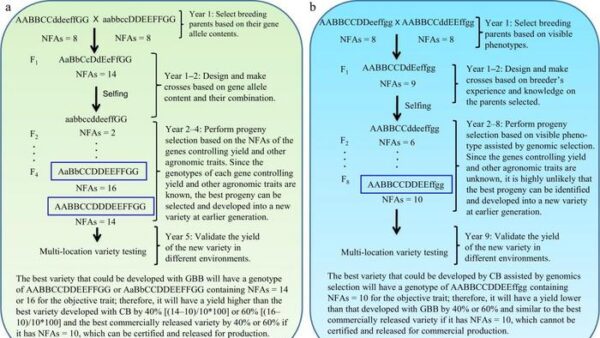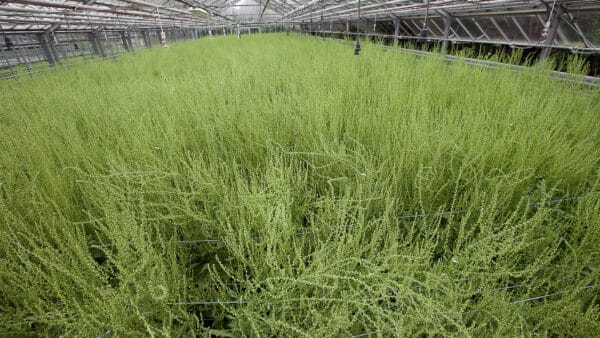Researchers have discovered an unexpected way to prevent soybean cyst nematode (SCN) from attacking soybeans. New research shows that nematodes that can reproduce on Peking genetic resistance appear to be exploiting a single gene – specifically the GmSNAP02 gene. When the gene loses function, SCN is unable to successfully access the soybean plan. Resistant soybean varieties like PI 90763 and PI 437654 appear to depend on exactly this method of defense, though how resistance was achieved was not known before now.
“Think of it like a lock-and-key model, where SCN is the key and GmSNAP02 is the lock,” explained Melissa Mitchum, professor in the College of Agricultural & Environmental Sciences at the University of Georgia and a member of the research team that made the discovery, in a press release. “If you get rid of that lock, the nematode can’t access the plant. You make the parasite ineffective.”
Mitchum said the gene discovery could have a “relatively immediate impact for farmers”, helping reduce SCN populations in fields with high and aggressive SCN populations where PI 88788 has been planted repeatedly.
The SCN Coalition, which issued the press release about the new discovery, reported being excited about the discovery. In its press release, SCN encouraged farmers and industry stakeholders “to continue to advocate for new tools like this”.
The soybean industry has relied near exclusively on PI 88788 genetic resistance for decades. On its website, the SCN Coalition outlines the risks of such continuous use of just one source of resistance. That risk is now reality. According to research conducted by Michigan State University between 2014 and 2021, virtually all of the SCN populations they tested had overcome resistance to PI 88788. A such, it is an urgent priority to find alternative modes of resistance that can be rotated with PI 88788 to control SCN populations.
The discovery of the GmSNAP02 gene’s role may prove a critical piece in alternative resistance. Already, farmers are increasingly using Peking-based resistance, which is a three-gene model. Adding GmSNAP02 would enhance resistance, reducing pressure on the other genes currently providing control and decreasing the likelihood of nematodes overcoming the Peking resistance.
“This is where this fourth gene comes into play. Adding a nonfunctioning copy of GmSNAP02 enhances the nematode resistance of Peking,” said Andrew Scaboo, assistant professor in the Division of Plant Science and Technology at the University of Missouri and co-spearheader of the project alongside Mitchum, in the press release. “If we can come up with a strategy now for using this and other genes in rotation, we could avoid a repeat of the situation we now have with PI 88788.”
The “quadruple stack” would mean greater genetic diversity avialble to farmers, which is critical to SCN’s long-term management.
“As we bring different modes of action into the rotation, we enhance the durability of all the tools in our toolbox,” Mitchum added.
Scaboo has completed one of an approximately three year research process to develop the plant material required to test whether omitting the GmSNAP02 gene affects crop yield.
Scaboo said there has already been substantial interest from private breeders.
“Nearly every major company and some of the smaller ones have reached out and set up meetings since the report on the discovery was published. That signals they know SCN is a big problem for farmers.”
Removal of the GmSNAP02 gene could be relatively easily implemented via CRISPR. Looking forward, this discovery may be just the start.
“The fact you could knock out a gene in a resistant background and gain more resistance was unexpected,” said Mitchum.
“Looking ahead, we want to understand how the nematode may be targeting SNAP02. Hopefully, that understanding will give insight into how we can further enhance durability of the tools in our toolbox and add to it.”
For more information about efforts to tackle SCN, visit thescncoalition.com.












